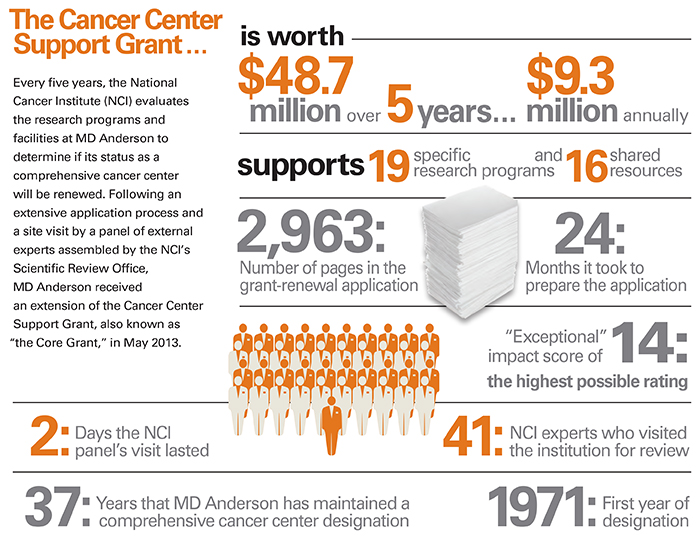Annual Report 2013 : treat the immune system, attack the cancer
The Cancer Center Support Grant
Every five years, the National Cancer Institute (NCI) evaluates the research programs and facilities at MD Anderson to determine if its status as a comprehensive cancer center will be renewed.


Infographic: Michael Clarke
More Stories From Annual Report

Going beyond skin-deep, to the molecular level
As a dermatologist and dermatopathologist, Kenneth Tsai, M.D., Ph.D., has set his sights on preventing squamous cell carcinoma — the second most common form of skin cancer in the United States.

Working for inheritors of higher risk
People with inherited conditions that raise their risk of developing certain cancers, such as colon cancer, deal with a lot of anxiety that comes from uncertainty about their health. Hopefully, the work of Eduardo Vilar-Sanchez will one day alleviate that risk.

Paving the way for trailblazers
Dallas’ Lyda Hill is determined to help solve “the mystery that is cancer.”

Ovarian cancer screening is put to the test, with encouraging results
An old blood test now offers new hope and possibility.

MD Anderson's 'protein pioneer'
In 1983, Robert Bast Jr., M.D., and his colleagues published a seminal paper in the New England Journal of Medicine detailing his discovery of the protein CA-125 and its value in helping to predict if ovarian cancer might recur.

A revolutionary war against cancer
Imagine if oncologists around the world had access to the expertise of MD Anderson’s physicians. The standard of cancer care would be greatly improved, and lives would be saved.

The resistance fighter
Historically, research and patient care have been kept separate or “siloed.” Guillermo Garcia-Manero wants to change that.

Triumph after a trial and tribulations
When Mary Cates was told she had cancer, she didn’t flinch . . . either time.

Cracking the cancer code
Cancer is a genomic disease, and Harshad Mahadeshwar’s job is to decode its weaknesses.

Training days
MD Anderson system is bolstered by Graduate Medical Education’s homegrown experts

With two, they’ve won
A year in, this duo of deans is racking up the accomplishments

Unleashing the immune system’s attack dogs
The first drug to improve the survival of people with end-stage melanoma works because of what it doesn’t do: attack tumors directly.

Trial fits attack on melanoma to a T
By boosting the number of T cells in his patients, Patrick Hwu is watching their immune systems defeat cancer.

The clone wars
Michael Gunter’s had time to think about melanoma.

Born to beat cancer
Marit Peterson may be genetically predisposed to melanoma, but the disease was no match for her and her team.

Strength in numbers: Send in the reinforcements
When immune system T cells that can’t kill a patient’s cancer get a shot at those same tumor cells in the lab, it’s another story altogether.

Building a better T cell
Treatments relying on T cells, a key component of the body’s immune system, have had significant success, but a new experimental method customizes naturally produced cells to sharpen their attack on cancer.

When good genetic mutation goes bad
Generally speaking, hypermutation and DNA damage in a cell are bad things. That is, unless you’re talking about an immune system B cell.

The Nocturnal Program: Care, uninterrupted
The Nocturnal Program ensures a seamless transition from day to night for patients

Nights are a good fit for Day
When Lakeisha Day sees a patient in the wee hours, she knows she needs to make the most of their limited time together.

Getting a lot out of giving
Gloria Ayala walked into a hospital room and found a mother pacing while her daughter lay in bed. When Ayala was greeted with a big hug, she realized the experience was what being an MD Anderson volunteer was all about.

Nowhere to hide
By exposing cancer cells, fluorescence makes surgeons’ jobs easier.

Team is the heart of the Head and Neck Center
Treating cancer while preserving form and function.

Free of cancer and full of thanks
Gift of gratitude boosts head and neck cancer research

Areas of expertise
Growing network of hospitals expands opportunities to end a global crisis


